
by Kasia | Jun 12, 2017 | Writing
In the middle of the night, when I go walking in my sleep…
and so the song goes.
Anyway, night time and writers. What is it about the twilight hours when you’re lying in bed and moments of inspiration hit whilst you’re trying to get to sleep.
Then come morning time that inspiration has evaporated into nothingness. You’ve forgotten everything because (a) you were semi-conscious, and (b) you lied to yourself about being able to remember the gem of an idea in the morning.
Solution?
Keep a notepad and pen by your bedside. Or if you prefer just open the notes section of your phone.
JUST WRITE THE THOUGHT/IDEA/STORY LINE/DIALOGUE DOWN!
Because, yes, you are going to forget it once the alarm starts ringing and you’re desperately searching for the snooze button so you can get that extra eight minutes of shut-eye.

I’ve noticed recently that when I watch a movie, read a book or skim through an article my brain starts spitting out little grains of ideas that could potentially become stories or subplots in my novels or articles for the blog. The reason for this is that by consuming other forms of media, news, and entertainment I’m feeling up the creativity well of my brain and sooner or later (hopefully sooner!) it’s going to overfill and spill over lots of cool concepts and ideas (I hope so anyway!).
My notebooks are overrun with ideas for different projects and I often lose track of where everything is. So now I’ve just created a Word file where I can store all the different little snippets of ideas that come to mind. It’s just one document with the ideas separated by a page break or ***
Yes, I still keep notebooks too.
Once my current projects are finished, I know that I’ll have a few grains of ideas that I’ll be able to develop into novel-sized stories.
So the moral of the story is, write shit down.
giphy.com/gifs/idea-apM9v0vujr5aE”>via GIPHY
The chief enemy of creativity is ‘good’ sense.
-Pablo Picasso
Feeling stuck for ideas? We all do sometimes. Whether it’s coming up with a brand new story idea, article angle or coming up with an original fighting scene, sometimes we are going to struggle.
There are a few things you can do to spark up the well and find an idea that will work for your story:
-
PLAY THE ‘WHAT IF’ GAME. WHAT IF CATS COULD TALK? WHAT IF ONLY ONE CONTINENT REMAINED ON EARTH? WHAT IF YOU WITNESSED A MURDER? WHAT IF THE GOVERNMENT WAS MANIPULATING THE PEOPLE IN YOUR TOWN? WHAT IF YOU WOKE UP AND IT WAS JUNE 1945?
-
LIST FIVE TO TEN OBSTACLES YOUR MAIN/SUPPORTING CHARACTER MUST OVERCOME.
-
THROW IN A CRYING BABY, A SHATTERING SECRET, A DEAD BIRD, AN AFTERNOON ATTACK, A LOST GIRL.
-
WHAT’S YOUR DEEPEST DARKEST FEAR? MAYBE YOUR CHARACTER CAN EXPERIENCE IT.
-
FREEWRITE ABOUT YOUR GOALS, DREAMS, AND AMBITIONS.
-
SEND YOUR CHARACTERS ON AN OVERSEAS TRIP. TROPICAL PARADISE OR WAR TORN CITY?
-
REMEMBER: WHO? WHAT? WHERE? WHEN? WHY? HOW?
-
QUESTION EVERYTHING YOU SEE AND HERE. ASK WHY? WHY NOT?
-
PLAY TOURIST IN YOUR HOME TOWN AND WRITE ABOUT IT.
-
CHANGE THE TOOLS YOU USE. TYPE, HANDWRITE, USE DIFFERENT NOTEBOOKS. COLOURED PENS. DICTATE.
-
IF ALL ELSE FAILS, TAKE A BREAK. GO FOR A RUN. MEDITATE. TRY A BOXING CLASS. READ A BOOK. DANCE LIKE NOBODY’S WATCHING. COOK A FEAST. THEN WRITE ABOUT IT.
-
ALWAYS CARRY A NOTEBOOK AND PEN. RELYING ON YOUR PHONE TO TAKE NOTES ALL THE TIME CAN BE DANGEROUS AND YOU DON’T KNOW WHEN OR WHERE YOUR NEXT BRILLIANT IDEA WILL STRIKE.

by Kasia | Jun 11, 2017 | Writing
Success. It’s a subjective concept.
What does success mean to you?
For me, it’s a lot of things but the epitome of success is:
(a) doing the things I love; and
(b) making a decent amount of money from those things.
Then I can say that I’m truly successful.
To date, I feel like I’m just treading water and getting nowhere. It sucks. It’s discouraging. I’m on the verge of succumbing to the rat race forever and forgetting about my dreams and aspirations.
I want to quit.
Quit my goals. Quit my dreams. Quit trying.
What’s the point when each day feels like I’m moving uphill with no end in sight?

But quitting would be the easy thing to do.
It’s what the majority would do. Then they’d go around demoralizing other people’s dreams by telling them ‘this doesn’t work’ or ‘that’s impossible‘ or ‘there’s no way you stand a chance’ because they gave up before they had a chance to get a taste of success or they never bothered trying.
Yes, these people exist. The naysayers, the negative bunnies who just want to rain on your parade to make themselves feel better. Most will do it unintentionally, some will be sinister. Each one will leave their mark but it’s up to you how you react to the negativity.
You can listen. Or you can tread your own path.
What I like about hills is that at some point, sooner or later (hopefully sooner!) you’re going to reach its peak and the view is going to be spectacular. You’re going to reach the pinnacle and feel success running through your blood. Then, you’ll set another goal and climb another hill, another pinnacle and so forth.
Which is why quitting isn’t an option. At least not for me. Even though there are days like most of this week where I’m asking myself, “what the fuck is the point?”
The point is, it’s important to me.
What’s important to you?
What keeps you awake at night? What do you enjoy doing in your spare time? What lights up the fire inside of you? What do you want your life to look like? What are you willing to sacrifice to make it happen?
When you feel like quitting it’s time to take a step back. Reassess. Break down the big goals into small action steps.
Hit restart. Keep moving forward even if you first had to take two steps back.
You’ve hit a wall with that novel you’re writing? It sucks. It happens. Acknowledge it. Have a whine or (a wine!). Then,
- Read over what you’ve written. Is there anything you can add, expand, edit out? Are there any story lines that you haven’t developed? Questions you haven’t answered for the reader?
- Jump to another scene or chapter. No one said you had to write your novel in a coherent order.
- Do you know how you want your story to end? Write the last chapter. It doesn’t have to be permanent. You’ll be changing, modifying and fixing the story during the editing stage.
- Brainstorm some scene ideas that will show the themes you are trying to share with your readers. Don’t censor yourself. Have fun with it, write down whatever comes to mind regardless of how crazy or lame it sounds.
Doubts don’t just affect writers.
Most people will have thoughts of giving up – whether it’s whilst training for a marathon, studying for a degree, working towards a promotion, paying off debt, starting a business or saving for a house deposit.
The steps we need to take to achieve our ambitions aren’t always going to be easy.
Sometimes they are fucking hard.
But our perception of these hurdles is what can help us jump over them.
Often they are just testing our commitment, sometimes they are forcing us to reexamine what we are striving for, at other times pushing us to step outside our comfort zones and find alternative solutions.
Whatever it is you want to do, when the going gets tough, don’t quit. Push through. Today, the task at hand may seem daunting, but tomorrow that feeling will pass and you’ll be a step closer to achieving your goals, whatever they may be.

by Kasia | Apr 7, 2017 | Writing
It wouldn’t a stretch to suggest I’ve fallen off the face of the earth. I’ve neglected this little piece of internet real estate for far too long. I’ve got a list of excuses but I won’t bore you with them.
Quarter 1 has been stressful and full on. I’ve taken on more responsibility and commitments than I probably should. But these things happen. We move on.

The upside: I’ve finished editing Book # 4 in the Lexi Ryder Crime Thriller Series.
The process has taken much longer than anticipated – lots of procrastinating in between!
It’s so easy to to over edit and ruin a story or never have it published. I’ve reached a point where enough is enough. It’s time to publish and move onto to the next project.
So, Lethal Games is heading to my proofreader and I’ll have the cover reveal and blurb out shortly.
Hooray!
BOOK SALES & GIVEAWAYS
The first book in the Lexi Ryder Crime Thriller Series is currently perma free on Amazon, Kobo & Smashwords.
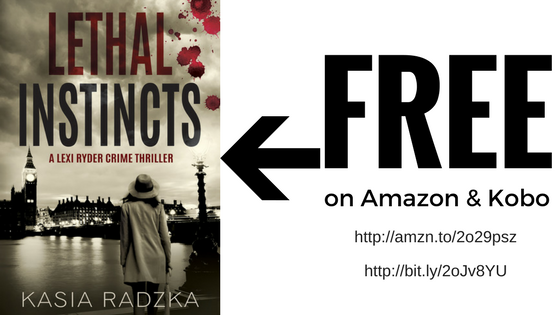
If you happen to download the book from Smashwords, I apologise but the formatting may be off. I’m in the process of reformatting all three books in the series.
The only marketing that I’ve done is some Twitter posting.
FREE BOOKS DOWNLOADED: 199
BOOK SOLD: 11

FREELANCING & SIDE HUSTLES
As much as I’d love to have time to hustle more and get freelance assignments, I just don’t have the time or the energy. Freelancing hasn’t been a priority.
That’s not to say that I’m giving up.
No, I enjoy writing articles and will submit queries and pitches. I’m just taking the pressure off having to do it. Which means I’m probably more likely to get shit done.
If you want to become a freelance writer, I highly recommend 30 Days or Less To Freelance Writing Success course. If you do everything the course instructs, you can start earning in the first 30 days of starting your freelance writing career. Check out this interview with Gina Horkey from Horkey Handbook for more info, So, You Want To Be A Freelance Writer or How To Become A Freelance Writer.
PITCHES SUBMITTED: 4
RESPONSES: 0
ON MY BOOKSHELF
I’ve set a goal to read 78 books this year. It’s been a slow start but here’s some of the books that I’ve enjoyed.
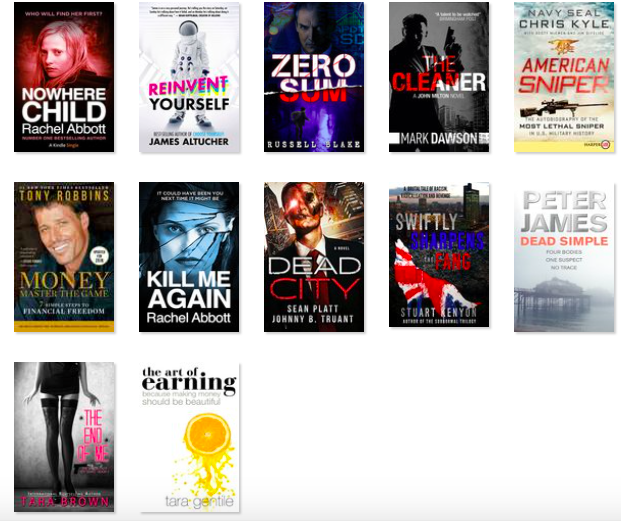
1. The Art of Earning: Because Making Money Should Be Beautiful
2. The End of Me by Tara Brown
3. Kill Me Again by Rachel Abbott
4. Dead City by Sean Platt & Johnny B. Truant
5. Dead Simple by Peter James
6. Swiftly Sharpens the Fang by Stuart Kenyon
7. American Sniper by Chris Kyle
8. Nowhere Child by Rachel Abbott
9. The Cleaner by Mark Dawson
10. Reinvent Yourself by James Altucher
11. Zero Sum by Russell Blake
12. Money Master The Game: 7 Simple Steps To Financial Freedom by Tony Robbins
Do you have Goodreads? We should connect.
CHANGES
I’m not happy with the look of this place. So over the next few months I’m going to have a redesign.
I want to share with you some awesome indie talent that’s out there and will start featuring indie authors and their books.
GOALS FOR QUARTER 2 (April – June)
1. Publish Lethal Games – Book 4 in the Lexi Ryder Crime Thriller Series
2. Reformat all three books and update on Amazon, Kobo, Nook, iBooks, Smashwords
3. Publish Omnibus – Book 1 – 4 in the Lexi Ryder Crime Thriller Series
4. Start marketing my books through Facebook, Amazon, Goodreads, etc.
5. Rebrand my website
6. Complete draft of my new series – a little horror, a little supernatural, a little forbidden romance.
7. Write and publish my first non-fiction ebook
8. Sell 100 books and giveaway 1000 books
9. Start a monthly newsletter
10. Create a schedule for writing and blogging and stick to it.
How is your year going? Are you meeting your goals for 2017? Have you read any interesting books lately?

by Kasia | Apr 3, 2017 | Writing
Consistency. My word for 2017.
The first quarter of 2017 is done and dusted and I’m curious to know where you’re at with your goals, your dreams, your day to day life. Are you living intentionally and enjoying every moment? Are you working to achieving the life of your dreams? Or are you still stuck in a spiral of failure that’s your own doing?
I hope it’s the former.
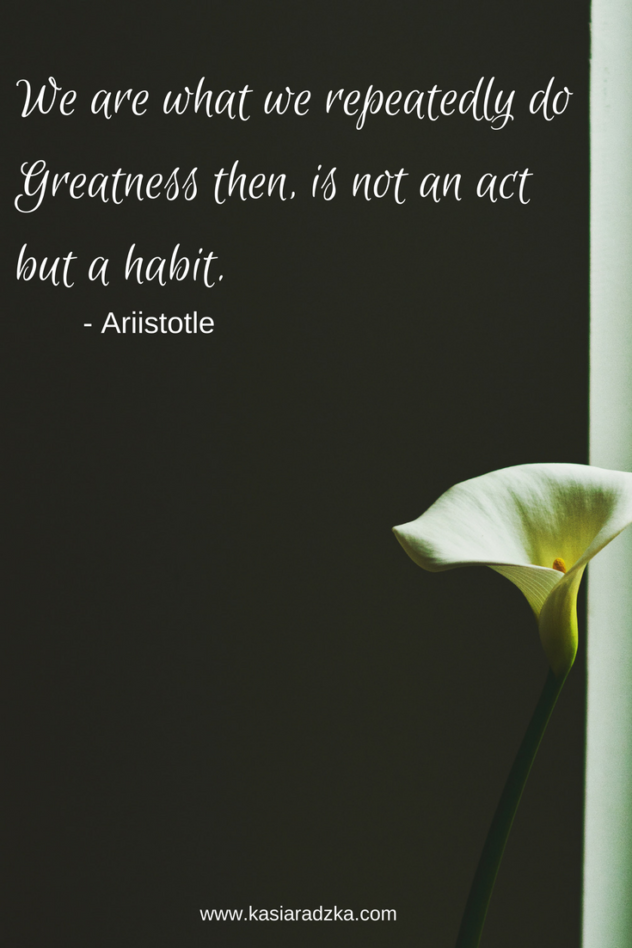
We’re well into 2017 but I feel like I still haven’t gotten my bearings. The past few months have been everything but consistent.
I make plans. They turn to shit.
I set goals. Obstacles emerge.
It’s frustrating as fuck and driving me crazy.
Consistency is a key to success in anything whether you’re trying to run a marathon, write a novel, grow a business, maintain an awesome relationship, lose weight or save for a house deposit.
Life doesn’t always go according to plan and it’s easy to give up on your dreams arguing that it’s just too hard or not meant to be. Bullshit. It’s you.
Yes, sometimes we draw the shit card. So what? That’s not a reason to fall into a cycle of a zombie like state and waste our life away by living groundhog day and ignoring the fire that burns inside.

HOW TO STAY CONSISTENT?
1. Quit the excuses
Excuses are too easy and too often we let them get in our way of achieving our goals and dreams faster.
Almost anything is possible, if we are willing to put in the effort to get it.
But excuses are debilitating. They lead to unhappiness. Dissatisfaction. Regret. Blame.
None of these are conducive to creating the life of your dreams.
If you don’t feel like doing something, do it anyway, even if it’s just for ten minutes.
Chances are that you’re going to keep going.
And remember, you’re always going to feel better having ticked off the item from your ‘to do’ list then if you made an excuse and put it off for tomorrow.
Just do it. It’ll help keep you consistent.
2. Figure out what you want
What is that you really want out of life? Is it to spend the majority of your life stuck in a cubicle making someone else rich?
Or maybe you’d prefer to travel the world, get up early or stay up late, spend more time with the kids, or just your dog without having someone else dictate your worth?
Maybe you like working but have always wanted a different career that offers flexibility and allows you to look forward to Mondays?
Once you can clearly see what it is that tickles you fancy, it’s going to be much easier to stay consistent and turn your dream life into reality.
3. Set clear goals with an action plan
Consistency requires that you have goals and action steps in place.
It’s easy to say, ‘I want so and so, but much harder to achieve if you don’t have a plan.
So many people say, I’m going to write a book or I’m going to lose fifteen kilograms or I want to travel the world.
The problem is they don’t make it a goal, they don’t create action steps that will ensure they will meet their objectives.
Writing a book for example is simple.
It’s not easy.
Once you’ve come up with your story kernel you have to keep your reader entertained for about 80,000 words through conversations, action scenes, recoveries, ups and downs before drawing them to a satisfying conclusion.
It’s tough.
But you can do it.
How?
“When asked, “How do you write?” I invariably answer, “One word at a time,” and the answer is invariably dismissed. But that is all it is. It sounds too simple to be true, but consider the Great Wall of China, if you will: one stone at a time, man. That’s all. One stone at a time. But I’ve read you can see that motherfucker from space without a telescope.”
― Stephen King
One word at a time as Stephen King would put it.
Start with one word. One sentence. One paragraph. One page.
Write a page a day and you’ll have a novel by the end of the year.
Write 2500 words a day and you’ll have a book by the end of the month.
Simple, isn’t it?
And it all comes down to consistency.
4. Make it a habit
Do anything for long enough and it’ll be come a habit.
Through consistent behaviour humans are capable of transforming themselves from fat slobs to fitness fanatics, from bankruptcies to riches, from dreamers to individuals living out the ‘impossible’.
But habits and consistency take effort.
Most of us are more likely to sway towards taking the easy route. Humans don’t like pain. Pain hurts.
But there are a few of us who are willing to push through. Push past the barriers. Jump over the hurdles, and achieve our wildest dreams.
We’re all capable of it, but we’re not all going to do it.
Which group are you going to fall into?
5. Don’t rush
Success in life isn’t a sprint. It’s a marathon.
If we rush certain things, we increase the chances of mistakes that can hinder our progress and results.
You’re not going to train for a marathon in a week if you’ve never run more than 100m chasing the bus of a morning.
You’ll start slow. Aim for running 1km. Then 5km. Then 10km. Then 20k. Finally you might consider the long one.
It might take you six months, it might take you two years.
It doesn’t matter.
The journey matters as much as the destination, sometimes even more so.
Stay consistent and you’ll enjoy the journey and reach a much sweeter destination.
6. Take responsibility
Your life. Your doing.
We get to a point in our lives where our choice have long-term consequences. It’s when we start blaming others for our problems that shit hits the fan and life doesn’t go to plan.
To be successful in whatever you’re doing is to take responsibility for the good and the bad. That means owning up not just to your success but also to your failures and then working towards self improvement every single day.
The only person responsible for not having the life you want is you.
You make consistent choices every day. These choices come with ramifications.
If you’re consistent with turning up late for work every day, well it shouldn’t be a surprise if your boss gives you a final warning.
If you’re consistent with sitting on the couch watching three hours of television each night whilst binging on a box of biscuits, it’s no wonder you can’t do up the top button of your jeans.
If you’re consistent with picking up after yourself then you know that your home is always going to be clean.
If you’re consistent with your savings, it shouldn’t be a surprise when your bank account hits six figures.
Work towards your goals, whatever they may be, with consistent effort and you will get there sooner rather than later. One day you will wake up and realise you have created your own success. Go out and celebrate.
HOW AM I GOING TO STAY CONSISTENT IN 2017?
So this year I’m focusing on consistency. There are three things that are important to me and I want to continue to improve on:
Books
Blogging
Training (Running, Cycling, Swimming)
The only way to be successful at anything is to be consistent with your efforts.
My goal is to eventually be a full-time author. Consistency means working on my books every day. This includes writing, editing, research and brainstorming.
I enjoy blogging. Maybe it’s the instant gratification thing. I’m going to aim for two blog posts per week. Stay tuned!
Training is important to me. I love taking part in triathlons and running events. This year I’m aiming to compete in a few. So, in order to achieve this I need to be consistent with my training. That means 5-10 hours of training per week. No excuses.
Consistency is key.
HOW DO YOU STAY CONSISTENT? WHAT ARE YOU DOING TO GET CLOSER TO LIVING LIFE ON YOUR TERMS?
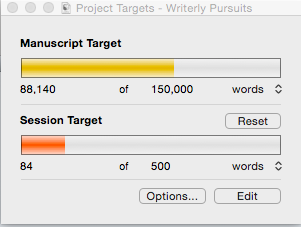
by Kasia | Mar 26, 2017 | Writing
Have you heard of Scrivener?
It’s a piece of software made especially for writers. Scrivener has been around for some time now and it can change your writing forever. You can check out a post I did here about how Scrivener improved my writing and made me more productive.
I use Scrivener every day for both my fiction and non-fiction and I’m still learning all the awesome functionalities available. Here are just some of the awesome capabilities the software has and it’s just scratching at the surface.
1 – Project Targets
I love numbers. So when I write I like to track what I’m doing. Scrivener has a Projects Target box where you can set the amount of words you want to write in your project (novel, non-fiction book, article, blog post, essay, etc), as well as a session target. The bar changes colour from a red to a green the closer you get to your target number of words.
While this can be distracting for some it’s motivating for others. The box doesn’t have to be open you can check it from time to time without having to look at it constantly too.
This function is especially useful if you’re doing NANOWRIMO and need to keep track of your words or you simply have a goal to achieve each day. I’ve been testing myself by aiming to write 100 words between each train station on the way to work. I generally surpass it (there’s 3-5 minutes between stations).

2 – Project Statistics
Gives you the stats about your entire project within the file. You can change certain parameters but it tells you the things you want to know about your project.
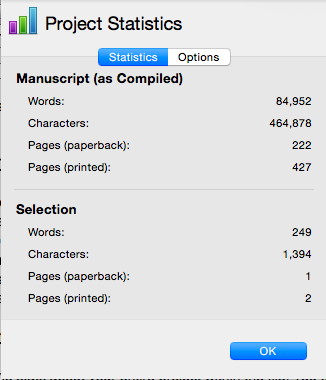
3 – Text Statistics
I only discovered this function recently and it’s helping me become a better writer.
I can see which words are being used more often than others in a chapter which can reduce the risk of repetition. It’s perfect for checking how many passive words you use and choosing alternatives.
To keep readers engaged it’s important to write in an active voice and avoid using ‘was’, ‘been’, ‘had’, especially when writing a novel.
But when you’re rushing through a scene it’s easy to get lazy.
Checking out your word frequency and ensuring that you use a variety of words and avoid passive language as much as possible will make your writing stronger and more pleasant to read.
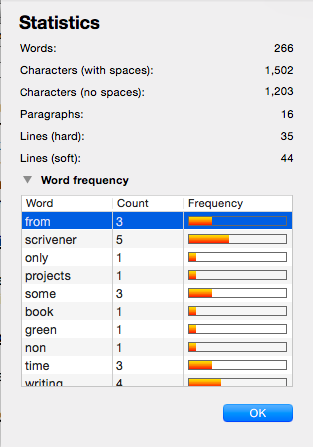 

4 – The Binder
The layout of Scrivener is visually appealing. While you can have just the writing screen open, I like having the binder and the comments section available at all times.
The binder allows me to organise my writing. I use it for writing fiction (three books using the software so far, and I’m still learning about its abilities), as well as non-fiction.
I use folders to separate the different non-fiction projects. I have this blog, as well as a personal finance blog and I’m working on an e-course and a non-fiction book for writers. If I get stuck on one project I move on to the next and because the binder is right there, I can move from one to the other without a hitch or wasting time searching through folders.
When writing a fiction novel, it’s easier to reorganise chapters without having to go through cutting and pasting. And sometimes reorganisation is a necessity.
5 – It’s all in one spot – research, writing, notes
When you write you want to have your research and notes all in one spot. Scrivener allows you to do that.
I use the comments section quite often to ensure that instead of starting and stopping with me writing I just put in a comment to check a resource, find an answer to a question, do some extra research, etc.
6 – Helps me stay organised
As mentioned above, organisation is important for a writer.
Time is limited and often we need more of it.
The less time you spend looking for things and shuffling through your work the more words you can get down on paper.
There’s no scrolling and searching. Everything is neatly set out. You can jump from chapter to chapter, scene to scene, and not get lost. The only thing you do get lost in is the world that you’re creating!
7 – Formatting for Kindle and epub
Formatting can be a pain in the backside. With my first novel I actually paid someone to do the formatting for me. Which is fine. You can find businesses that will format your book for you and charge you anywhere from $100+ for their efforts.
Scrivener can do it for you without charging you any extra than what you paid for it. Once you buy the software (only $45US). It’s yours to use forever and it’s available for Mac and Windows and now even the IPhone and IPad. Awesome.
You can compile your document and export it to Kindle, epub, print, novel format, draft format and several others. You do need to fiddle with the options to get what you want the first time you do it but then with each book after you know exactly which settings to use and you don’t need to be spending a hundred or more dollars on getting your book formatted. It works for fiction and non-fiction.

8 – You can Import files from your computer and the internet
Scrivener allows you import files from your computer and the world-wide web. Did you find a piece of research that you want to use in your next book? Fantastic, you can save it to Scrivener so you don’t have to waste time searching for it again and having to open extra screens.
How about pictures?
Scrivener will hold your images for you too.
If you’re writing a novel you might have a section for your characters. You can find a picture that resembles the character in your story and add it in. The same goes for your setting.
9 – It saves your work automatically
Are you paranoid about losing your work? Scrivener automatically saves your work eery few seconds which is great for writers who forget to click save regularly.
When you hit delete. The work goes into the trash but it’s never completely deleted until you go in and empty the trash can. That means if you accidentally delete an article or chapter you can retrieve it.
10 – It has a useful corkboard
The corkboard is useful for organisation and giving a visual of what you’re writing. You can quickly outline your chapters with just a sentence or a few paragraphs. Then once the story is set you can add more details.
I used the corkboard to outline my next book within an hour on the commute to work. It’s the e-version of using cards.
As you can see I’m a huge fan of Scrivener. I’ve been using it for about three years now and it’s been integral to my productivity and efficiency. If anyone asks about it, I’m ready to scream at the top of my lungs, ‘Get Scrivener!!!’ Just get it, you won’t regret it.

If you want to try Scrivener you can do so at no cost for 30 non-consecutive days. What business offers that sort of trial? I haven’t heard of many. It took me more than a year to use up my free trial. I was procrastinating over $45. But as soon as I realised what I could achieve with the software it was the best money I have spent for my writing career.
Need a crash course in using Scrivener to save you time and get you writing ASAP? Check out this course, Learn Scrivener Fast.
How do you use Scrivener?
* This post contains affiliate links.













